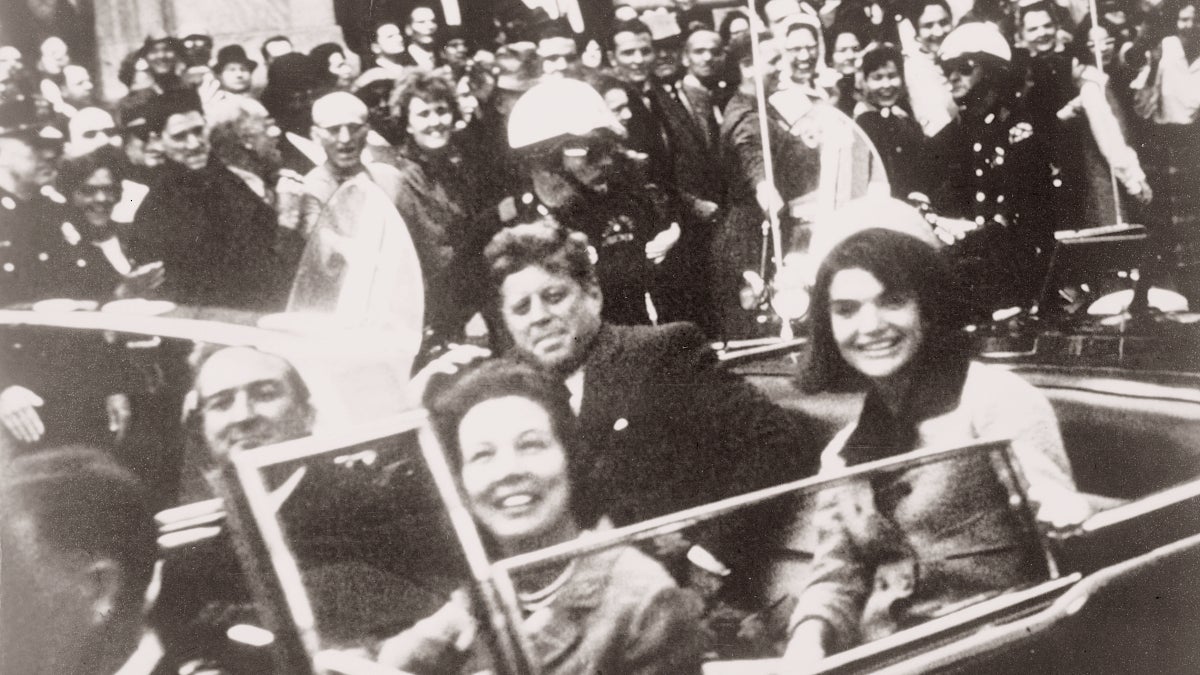Why the JFK conspiracy theory still haunts us
Listen
John F. Kennedy motorcade, Dallas, Texas, Nov. 22, 1963. (Victor H. King/Library of Congress Prints and Photographs Division)
A few years ago, I found myself on an airplane sitting next to an elderly gentleman. Talk turned to a recent election, and he railed against the runaway costs and bloated inefficiencies of “big government.” But when he noticed that I was reading a book about John F. Kennedy, he insisted that this same bungling, inept government had somehow managed to kill our president—and to keep it all a secret.
“It was a conspiracy,” he said. “The CIA, the FBI, the Secret Service. Everybody was in on it.”
I’ve been thinking about this exchange as we approach the 50th anniversary of JFK’s murder, which has occasioned another round of national debate about who “really” killed Kennedy. Even former Minnesota Gov. and pro-wrestling star Jesse Ventura has gotten in on the act, releasing a new book called 63 Reasons to Believe There Was a Conspiracy to Assassinate JFK.
But Americans don’t need that much convincing.
According to a survey conductedin 2012 by Hart Research Associates for a new book by University of Virginia professor Larry Sabatao, three-quarters of us reject the Warren Commission’s claim that Lee Harvey Oswald acted alone in killing JFK. We’re much more likely to believe it was the Cubans, the Russians, or the Mafia—or the federal government itself. In a 2003 Gallup poll, 34 percent of respondents said the CIA was responsible for Kennedy’s death. Another 18 percent pinned the deed on Lyndon Johnson, JFK’s successor in the White House.
Meanwhile, Kennedy’s reputation has continued to grow. His popular stock had already spiked by 1964, when nearly two-thirds of Americans claimed to have voted for him; in fact, less than half of the electorate cast ballots for JFK four years earlier. Today, polls consistently rank him as the best president of the past half-century.
In the popular imagination, Kennedy embodies our country’s long-lost power and optimism. Once upon a time, the story goes, we stood tall on the world stage. But when JFK died, the American dream died with him. We fell into a long tailspin of national decline, searching in vain for the skill and strength that we lost on Nov. 22, 1963.
But if you look at what happened on that day, and in the days and weeks that followed, you see exactly the opposite: massive incompetence and bureaucratic blunders. Amid our greatest postwar tragedy, the so-called “greatest generation” dropped the ball.
Start with the Dallas police, which let pedestrians roam around Dealey Plaza after Kennedy was shot. Later that day, a young medical student found a piece of JFK’s skull and turned it into authorities. How many other souvenir-seekers took crime-scene evidence home?
On the sixth floor of the Texas Book Depository, police gathered the cartridge cases from Oswald’s rifle without marking where each one was found. And when the president’s limousine reached Parkland Hospital, they wiped off the blood from the car before it could be examined for splatter patterns and other crucial details.
Then there’s the FBI, which had been tracking Oswald for many months. Agents knew about his violent past, as well as his attempt to defect to the Soviet Union; they also knew that he worked at a warehouse on the president’s motorcade route. To cover its own skin, the agency destroyed its file on Oswald after the assassination.
The Warren Commission’s mistakes were legion, too. It failed to interview dozens of witnesses who were at or near the murder scene on Nov. 22. Nor did it probe the CIA, which was busily covering up its own efforts to kills Fidel Castro. Had they known about that history, several Commission members said later, they would have paid more attention to rumors about Castro’s involvement in the JFK murder.
But secrecy doesn’t prove conspiracy; it merely feeds it. The much more likely culprit is simple incompetence. As my friend on the airplane noted, government agencies are notoriously clumsy and cumbersome. It’s hard to imagine that they could pull off a plot as immense and risky as the murder of a president.
So why do so many of us continue to believe it? Perhaps it’s a way to protect Kennedy’s image, and the reflection of ourselves that we see in it. If John F. Kennedy could be felled by a loser like Lee Harvey Oswald, who was acting all by his lonesome, then JFK wouldn’t be the giant that we’ve made him out to be. There would be no great shining moment, no thousand days, no Camelot.
We would no longer be young innocents, pining for the departed father that we never really knew. We would put away childish things. And we would grow up.
_________________________________________________
Jonathan Zimmerman is a professor of history and education at New York University. He is the author of “Small Wonder: The Little Red Schoolhouse in History and Memory” (Yale University Press).
WHYY is your source for fact-based, in-depth journalism and information. As a nonprofit organization, we rely on financial support from readers like you. Please give today.

